c1900
now browsing by category
C1900 New England Impressionist Landscape Painting Signed William Merritt Post

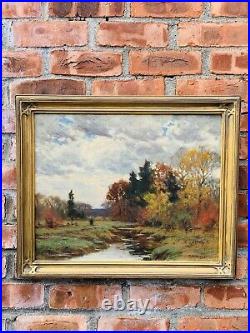
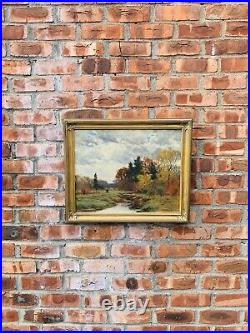
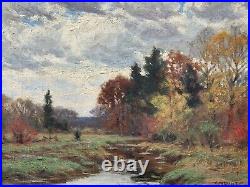
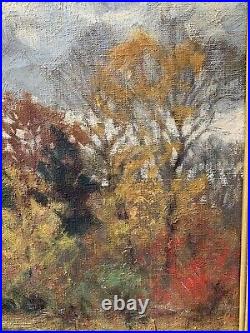
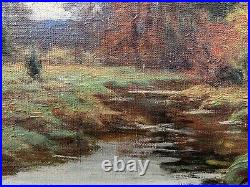
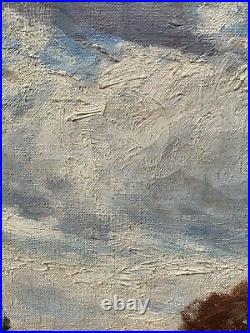
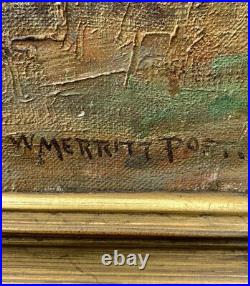

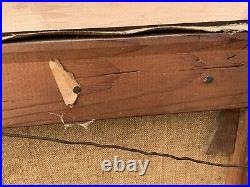

For sale is a beautiful New England Impressionist Landscape painting by the highly regarded American artist William Merritt Post (1856 – 1935). Probably Circa 1900 to 1910 in age. Post was well regarded during his time for his renditions of New England landscapes. He painted in a tonalist and impressionist style which he merged together and often used very similar settings in his landscapes including tall trees open fields and calm quiet meandering streams under cloudy skies. This painting has all of those qualities. Fresh from a Hudson Valley estate in upstate New York. Signed W MERRITT POST in the lower right corner, which is how he signed after 1884. Due to high definition camera the painting is somewhat darker in hue than pictures outside in natural light. Framed in a contemporary but very appropriate arts and crafts Plein air picture frame. The painting may not have ever been varnished. Hard to tell but we dont notice an obvious varnish layer. Surface grime as associated with age. Two non obtrusive pin sized surface paint losses. One area of circular craquelure in the sky. Framed – 19 1/2 x 23 1/2. Canvas – 16 x 20. William Merritt Post (1856 – 1935). Born on December 11, 1856 in Brooklyn, Post was the son of a commodities merchant. His parents separated after sixteen years of marriage and four children, suggesting a troubled home life. Post’s attraction to nature began in the fall of 1879, when an excursion from Brooklyn to a marshy region made Post think, If I were an artist, this region would be one of the first places I would strike out for. Unlike many artists of the day who studied in Paris, Germany and Holland, Post developed his eye for composition, his technical knowledge of the craft of painting and his deft draftsmanship in the artistic community of New York. At the age of twenty-four, he began taking drawing lessons from the relatively unknown Samuel Frost Johnson. By 1880, Post had already begun painting Hudson River pictures on academic board and signing them W. Paintings during this phase were signed W. By 1884, Post was twenty-eight and had launched a career as a landscapist. That same year, the National Academy of Design accepted for its autumn exhibition one of his paintings signed W. This remained his signature for the rest of his professional life. It was in these years that he became greatly influenced by the landscape painter, Hugh Bolton Jones. Both men were attracted to tightly focused landscape scenes, particularly streams amid trees and meadows, and their primary goal was to capture light at different times of day and in different seasons. This predeliction, in turn, drove both artists to excursions outside of New York into the countryside of the marsh towns in New Jersey and on Long Island. It was in the marsh areas of Milburn, South Orange and Nutley, New Jersey that the country stream emerged as an infinitely variable formula to display subtle reactions to a particular aspect of nature. In the 1890s, Post perfected the country stream motif and the evident salability of these paintings no doubt explains how he became financially independent of his father, and it also obliges us to assume that his significance as an artist depended on his vituoso interpretation of this theme to the end of his long life. Post exhibited continually at the National Academy of Design, the Philadelphia Academy of Fine Arts as well as the Boston Museum of Fine Arts. He also exhibited in Buffalo, Chicago, St. Louis and Washington DC (the Corcoran gallery), receiving many awards. Also an active member of the two watercolor clubs that had been established in New York City, Post was later elected an associate member of the National Academy of Design (1910). Post’s era was really the first when American artists could actually make a living from their art. Biographical dictionaries suggest that there were more than a thousand artists living in New York City at the turn of the century. Many landscape artists spent extended periods of time in the coutryside sketching, which Post had done since the early 1880s. In 1906, Post married his wife, Katherine Van Nest. He was 49; she was 36. They had a daughter, Katherine later Mrs. Gardner, three years after they wed. Even though Post became noted for his landscape paintings done in Connecticut, the Posts always kept an apartment in the city. The Posts first summered in Bethlehem, Connecticut around 1908. With the help of New York architects, the Posts completely remodeled the place adding a studio addition in the process. The Bantam River ran westerly at the back of the property. After settling in his West Morris studio, Post began painting plein-air landscapes, and traveled throughout the northeast, collecting landscape motifs in his sketchbooks. Perhaps more so than any other American artist, he was fascinated with country streams and reflections on water, and concentrated on these themes all of his professional life. Connecticut had been attracting landscape painters for decades, but most of them were attracted to the shoreline colonies at Cos Cob, Old Lyme and Mystic and to an Impressionist approach to landscape painting. Post stands apart for his choice of a rural retreat in the northwest hills of Connecticut and his steady exploration of his chosen theme, the country stream. While his peers turned toward the bright palette of Impressionism, he remained committed to tonalist hues and the rich greens that also appealed to his mentor, Hugh Bolton Jones. Those seeking an escape from the increasingly urban New York metropolitan area, rode the Shepaug Railroad, completed in 1872, into the quiet Litchfield colony, where they helped create and preserve an idealized rural lifestyle, a reminder of an America that they feared was rapidly disappearing. This railroad ran only a few miles from Applewood. When at the age of seventy, Post moved back to Manhattan with his wife to be close to their daughter, Post’s only serious professional effort lay in offering two paintings at the National Academy of Design annual exhibitions about 1930. This was later reduced to one painting per year. William Merritt Post died in New York City of heart problems on March 22, 1935 at the age of seventy-eight. The item “C1900 New England Impressionist Landscape Painting Signed William Merritt Post” is in sale since Friday, May 1, 2020. This item is in the category “Art\Paintings”. The seller is “upstatetreasures14″ and is located in Kingston, New York. This item can be shipped to United States.
- Medium: Oil
- Subject: Landscape
- Date of Creation: 1900-1949
- Style: Impressionist
- Originality: Original
- Listed By: Dealer or Reseller
- Region of Origin: New England
- Painting Surface: Canvas
- Artist: William Merritt Post
- Size: Medium (up to 36in.)
- Features: Signed



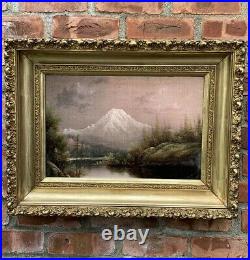
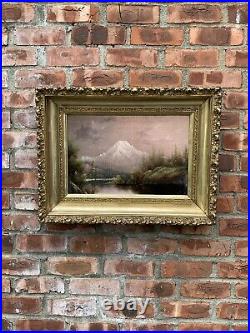
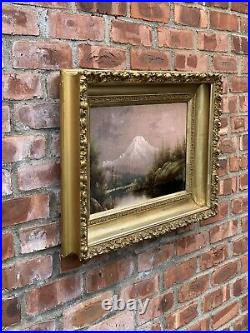
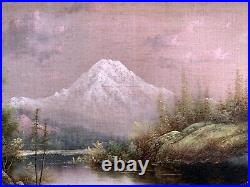
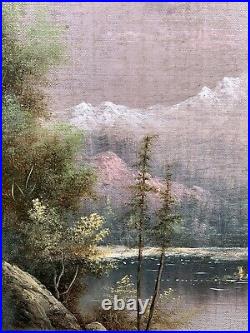
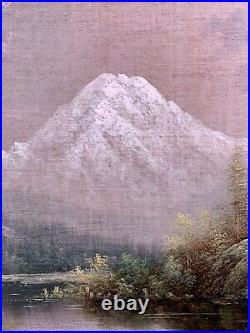
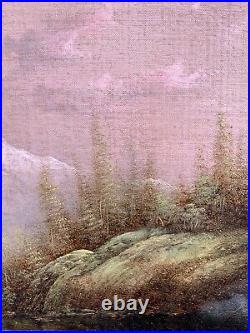
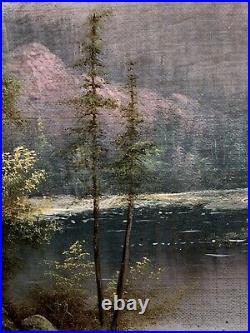
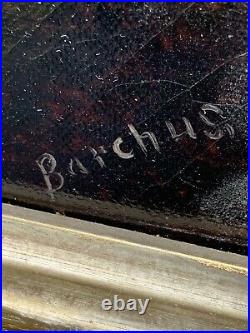
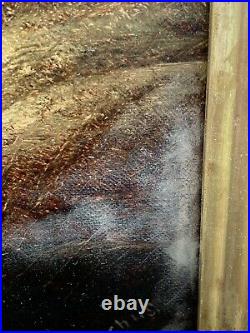
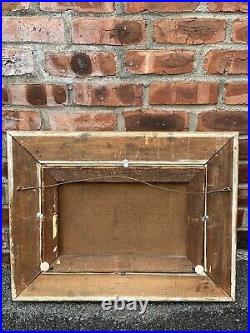

 D5 Creation
D5 Creation